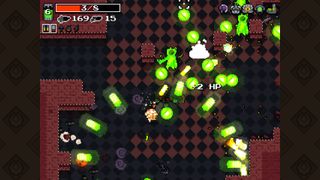Game devs say Unity's new install fee is a threat to everyone, including gamers, and there's no going back: "I don't want to sell my house because my game was too popular"
"I've never seen this level of unanimous agreement between developers that something is really bad," says Rami Ismail

Games are generally made using the tools and resources of foundational software called engines, and Unity is one of the most-used and therefore most important engines in the entire games industry. So it was scorched-earth news for the leadership at Unity to abruptly announce a new fee which would charge developers every time someone installs a game that was made with Unity – including future and retroactive installs – beginning in 2024.
Unity's promised pricing thresholds that would ostensibly shield many developers from the fee, and in the fallout of the news it's rushed out vague assurances about what counts as an install. But the response from the game developers who've had their livelihood threatened by this change has been withering and unwavering: this is catastrophically bad for everyone, and even if Unity completely walks it back right now, it will have lasting damage on the industry.
GamesRadar+ spoke to 10 game developers, many of whom would be directly impacted by the new Unity fee. The fee presents multiple problems that Unity has yet to prove it can solve, but while responses varied in focus, every dev agreed that this policy will only hurt people who make games, and by extension, people who want to play good games.
It ultimately leads to worse experiences for the users and the developers overall.
Maxwell Kunze
"As a company that develops a platform that many, many other developers rely on, I think this change, along with its announcement, has been handled very irresponsibly," says Hoversport Studios co-owner Maxwell Kunze. "Not only do I see this change in policy as being pretty bad for the developers, I think the way they wish to enact it is a betrayal of trust. Many devs, including myself, would not have chosen to even start making projects in Unity if those were the terms right off the bat. Fewer devs would be making free games in Unity if there was a chance that, if their games become an overnight success, they'd suddenly owe a ton of money!
"They discourage free experiences and encourage creators of existing games to either remove their games to avoid having new expenses, charging for their games, or putting up advertisements on their products. It ultimately leads to worse experiences for the users and the developers overall."
Revenue bombing

Kunze skewers the announcement for omitting details on how installs are tracked, how that data is shared, as well as failing to adequately account for the coordinated abuse that this fee would enable.
Much more so than with today's review bombings, malicious users could cause real financial harm to Unity-made games by spamming installs, and thus far Unity has seemingly passed the buck to developers to identify and dispute revenue bombings like this. Piracy, bots, delisted games that can still be installed – "these are all hypotheticals that Unity may address in the future," Kunze says, "but the fact that it's absolutely not clear from the get-go spells bad news. I wouldn't be surprised if it turns out there's something straight-up illegal about it too. I've lost a ton of faith in Unity. Even if they don't go through with this, they've shown me their hand."
Sign up to the GamesRadar+ Newsletter
Weekly digests, tales from the communities you love, and more
Tyler Glaiel of The End is Nigh, The Basement Collection, and many more games says this isn't Unity's first stumble, but it has killed the engine in his eyes: "I will never even consider Unity for new projects now. Sucks for developers who are in the later stages of a big Unity project who can't afford to switch engines at this point. Everyone else I'd strongly recommend considering switching." The makers of hotly anticipated Soulslike Another Crab's Treasure have found themselves in exactly this situation, and were among the first to argue that this "threatens the sustainability of our business."
If they can do this, what else can they do? Even if this change doesn't impact me now, will the next one screw me over?
Leonardo Hanon
"I don't even think this is a rollback-or-bust scenario," Glaiel adds. "I think even if they do roll it back, that's still not enough. Unity has been increasingly adopting more and more dev-hostile policies over the years while doing little to actually improve their engine and letting features rot. Even if they roll it back it's likely they'll do something else to fuck you over in the next few months anyway. That's the path they're on."
Developers who, like Glaiel, aren't actively using Unity also criticized the effects this fee will have. For one, development skills and processes don't transfer perfectly between engines, so even if a developer can change engines in response to this news – to say nothing of the 12-month Unity licensing agreements that users can't just up and break – this can cause delays, expenses, and a huge knowledge sink as people struggle to jump to a different train.
"Let's just say we're glad we don't use Unity, but we definitely feel for our fellow indie devs who do," says Blossom Tales developer Castle Pixel. "Unity is basically trapping them for investing time and effort into their tools, which definitely sucks."
"I'm disillusioned," agrees Gorathar developer Leonardo Hanon. "As an indie game developer, you weigh your options early on to see what you want to invest time to learn. And it's not only learning, but spending years developing a product using their technology. You never consider the fact that the terms can change with little to no advanced notice. And that they can apply retroactively. Already you feel like you're fighting against the current by doing everything on your own, and then the tool that you've invested so much in decides to make a significant change? It makes you feel outright helpless. If they can do this, what else can they do? Even if this change doesn't impact me now, will the next one screw me over? How can I trust it?"
Developer exodus

This problem isn't hypothetical. The fee isn't here yet but 2024 is not far off, and Unity's proposition is already wreaking havoc on innumerable games. "The announcement from Unity is astonishing," says general manager Christian Lövstedt of The Battle of Polytopia dev Midjiwan AB. "Developers of all sizes face confusion - rather than celebration - if their game succeeds, with budgeting and forecasts turned on their head. Confusing messaging from Unity has resulted in u-turns. Sure, charity bundles have been labeled exempt, but how will this be tracked? Without answers, Unity will face growing mistrust from the developer community as alternative engines are explored."
This pricing can turn a Unity developer's entire backlog into a threat to your survival.
Anonymous veteran dev
"I love using Unity," says Xalavier Nelson, head of Strange Scaffold. "I think there's a lot of good people over there, I've promoted the engine, and I appeared on panels for Unity developers fairly regularly. With all of that said, if this policy is retained I'm going to convert (and if necessary, cancel) every Strange Scaffold project attached to Unity where it is possible to do so – and I'm already investigating the costs that will be necessary to make that happen."
"We are already talking about moving to Unreal for our next projects," says OddBugStudio co-founder Jack Bennett. "Even though it would mean leaving behind over 10 years of knowledge and pipelines. The writing is already on the wall. No publisher is ever going to sign a Unity game knowing that they're going to have to pay a tax on every install. No platform holder is going to do a subscription deal for a Unity game knowing they're going to pay a tax on every install. So really our hand is already forced."
One veteran developer who wished to remain anonymous says: "If this pricing goes ahead I think we could see a lot of cheap and F2P games being taken off stores to avoid fees. This pricing can turn a Unity developer's entire backlog into a threat to your survival. I’ve already seen a lot of devs leaving Unity before this. I think this will just be another nail in the coffin. Even if this doesn’t directly affect our business it’s hard to trust a company with the backbone of your game when it’s trying to nickel and dime you like this."
Financial risks

The financial danger of this policy can't be overstated. Muck and Crab Game creator Daniel Sooman estimates that this policy would have cost him $5.6 million just for his free, viral multiplayer games. But the install fee represents so much more than a flat rate per user.
Vlambeer co-founder and industry consultant Rami Ismail points out that this fee means demos, bundles, giveaways, updates, and multi-device support are now a direct risk for developers because they would drive installs – which is supposed to be a good thing, right? And with Unity apparently planning to put Xbox on the hook for install fees on Game Pass games, this policy would also crush any Unity developer's ability to secure increasingly vital subscription service-based deals.
"For Unreal games [Microsoft pays] nothing," Ismail says of Game Pass. "So why would they pay 20 cents on the copy? That's worse for developers than us having to pay. I don't know how they went from bad to worse. But like, that is arguably worse. Now, developers, it's atrocious, right? Don't get me wrong, 20 cents on free copies for Game Pass? That'll bankrupt most game companies that use Game Pass. But putting it on Microsoft means we won't even have the opportunity of suggesting it to Microsoft anymore. Or Apple Arcade, right? Or any of those. So that's bonkers."
"What happens with our games that are already out?" asks Antoine Bordeleau, general manager at indie specialist marketing agency Purple is Royal. "We're going to have to pay fees for titles that are completely out of our current marketing cycle? How are they going to effectively track which past 'install' is billable for titles that have been out for years and have been part of many a promotion, Humble Bundle, etc.? What happens with our Game Pass deals? Microsoft can't be happy to learn that they will be footing the bill for games that are doing well on their service."
Buy Cult of the Lamb now, cause we're deleting it on Jan 1st. 😘 https://t.co/nSWg9DP0shSeptember 12, 2023
Cult of the Lamb developer Massive Monster, which has produced one of the biggest roguelike hits in recent memory, writes: "The demo we made for Steam Next Fest had over a million downloads - which would have put us over the install threshold before our game even launched. Not to mention selling in bundles, games targeting lower price points or F2P models, which all rely on high numbers of install rates and are all now in question.
"Beyond the concerns about revenue bombing and how the hell they even track installs, it's a very scary proposition that an engine like Unity can seemingly change their TOS and the way they charge developers out of the blue, and for it to financially impact past and current projects, with absolutely no way out for developers. Even if we did pull Cult of the Lamb from all stores and stop selling it anywhere, we would still be charged for legit sales that decide to install/reinstall the game, and potentially installs of pirated copies too. I can't see how that is legal, and they absolutely have lawsuits coming their way."
"I think Unity has made some moves in the past few years that have been poorly received," Ismail adds. "I've never seen this level of unanimous agreement between developers that something is really bad. Which is remarkable; in that way they're really living up to their name."
Echoing countless devs, Ismail notes that this policy was "sprung on developers" in a way that nobody can plan for. "The way the Unity license works is that you can't pull out of this agreement before these changes come into play," he explains. "It's a rug-pull. They say one thing, they even made a promise years ago that they wouldn't spring term changes on you, and then here they are."
Tracking installs is like stapling rain to a tree

Other engines like Unreal charge users based on gross sales – 5% in Unreal's case. Several devs argued that an install-based fee is totally divorced from the way a game's success is measured and how games are promoted and distributed nowadays. On top of that, it's a policy built on what's regarded as an unknowable figure. Like many, Ismail doubts how Unity will track installs when game developers, mobile devs notwithstanding, normally don't (and frankly can't) monitor installs because "it's not the kind of data that makes any difference."
I really don't want to gamble 20 cents on an install if installs can be infinite.
Rami Ismail
"We have no idea how this will be implemented," Bennett concurs. "We have no concrete information on what they do and do not count as an install, no concrete information on who is going to be charged. The platform? The publisher? The dev? Most ridiculous of all, the current information we have on how they'll work out the charge is 'trust us, we wouldn't lie to you.' As well as this, the concept of piracy is being massively underestimated by Unity. Each time the game is pirated and installed under these new plans that would be a straight loss for us as a studio, not to mention if that pirate were to then use this new system to 'revenue bomb' us because they didn't like the game they stole. Again Unity assures us that they have this under control and have a way to differentiate pirates from legitimate sales, but again no concrete evidence of this."
"In my DMs I have three dozen developers that are all looking at what to do and how to switch [engines]," Ismail concludes. "A lot of them have sent emails to Unity. I've seen conversations about class-action lawsuits. I've seen conversations about reaching out to see how this falls under European regulations. I'm seeing people jump ship at Unity, which is huge. I'm hearing word that some people who are good at [multiple] engines are starting to offer their services for helping studios move over, and they're getting job offers."
"Unless we all start tracking installs in some way that is somehow privacy approved, there's just no way for us to know. I don't see why I would trust that this process will work. I have somebody in my replies that said, 'no, no, these things will not count.' That's great. Is that on paper somewhere? Because I really don't want to gamble 20 cents on an install if installs can be infinite. I'm not gambling that. I really like financial stability. I just bought a house. I don't want to sell my house because my game was too popular."
Austin freelanced for the likes of PC Gamer, Eurogamer, IGN, Sports Illustrated, and more while finishing his journalism degree, and he's been with GamesRadar+ since 2019. They've yet to realize that his position as a senior writer is just a cover up for his career-spanning Destiny column, and he's kept the ruse going with a focus on news and the occasional feature, all while playing as many roguelikes as possible.
- Iain HarrisDeputy News Editor

After 2.5 million sales, Manor Lords publisher says it "would almost be arrogant" to not be surprised by the city builder's success - but "you cannot count on it to repeat"
Assassin's Creed Shadows adds a "canon mode" that makes choices for you, after fans spent years unsure of what RPG choices meant for the series' story
Most Popular





